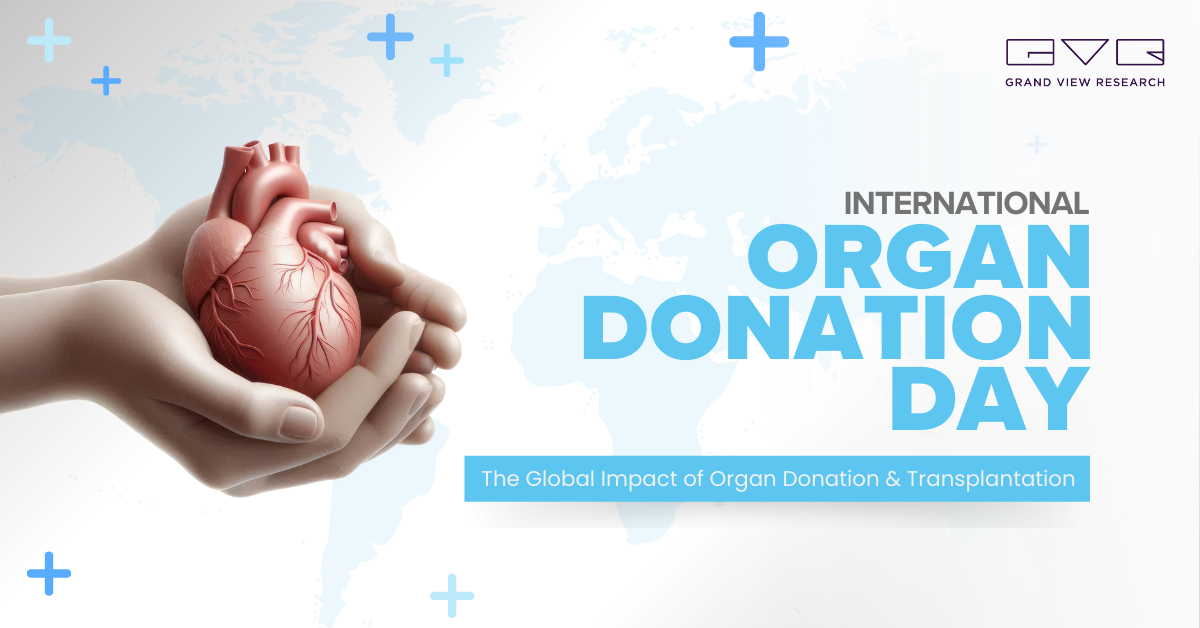International Organ Donation Day: The Global Impact of Organ Donation & Transplantation
International Organ Donation Day is celebrated every year on August 13th to raise awareness about the significance of organ donation. Organ donation can save the lives of people suffering from chronic diseases, such as heart, lungs, pancreas, kidneys and eyes. Morbidity and mortality lingering with organ failure alludes to the importance of encouraging conversation, addressing organ shortage and busting myths surrounding donation. Unfortunately, not everyone who needs an organ gets one in time. Health Resources and Services Administration (HRSA) notes that 17 people lose their lives each day waiting for an organ transplant, while every donor can improve more than 75 lives and save 8.

Hospitals, governments and regulators have seen organ transplantation as a light at the end of the tunnel ever since the Kidney became the first human organ to be transplanted successfully in 1954. The late 1960s witnessed successful transplantation of the heart, pancreas and liver. Meanwhile, intestinal organ and lung transplants started in the 1980s. In what was dubbed a “historic milestone,” the U.S. touched the 1 million transplant mark in September 2022. Notably, according to HRSA, 27,332 Kidney transplants were performed as of March 2024.
From grappling with the despair of the potential organ rejection to the number of transplants performed in 2024, medical advancements in the prevention and treatment of rejection have come a long way, providing a safe haven for successful transplants and a surge in demand for organ donors.
Organ Transplantation
Organ transplantation involves a surgical procedure to replace a failing organ and is termed one of the greatest advancements in modern medicine. Donated tissues, such as bones, tendons and corneas, and organs, can provide a second chance at life; however, there is broad daylight between demand and supply.
Cleveland Clinic claims that merely 40,000 transplants are conducted in the U.S. vis-à-vis more than 100,000 people waiting for the life-saving transplant. Adding insult to injury, more than 89,000 patients were on the waiting list for Kidney transplants (as of March 2024). While these organ donation statistics paint a poignant picture, a ray of hope emerges with the prevalence of immunosuppressant drugs and transplant diagnostics.
What are Immunosuppressant drugs?
The need for immunosuppressant medicines or drugs becomes critical to reduce the body’s ability to reject a transplanted organ. Rejection occurs when the immune system identifies the transplant as foreign, causing a response that can decimate the transplanted tissue or organ. The U.K. NHS has implied that the rejection rate is 30%, with the risk of rejection becoming the highest in the first 6 months of the transplant.
The organization recommends “not to stop” taking immunosuppressant (anti-rejection) medicines. Meanwhile, in September 2023, BBC reported that an eight-year-old girl became the first child in the U.K. to receive a type of Kidney transplant that does not need to take long-term drugs to stop organ rejection.
The rising penetration of induction drugs used at the time of transplant and antirejection medications used for the long-term has apparently fueled organ transplant immunosuppressant drug market. The demand is such that maintenance drugs, such as Calcineurin Inhibitors and Sirolimus, have become sought-after to avoid kidney rejection.
Sirolimus Medication
The need for organ transplant drugs makes sirolimus medication—an mTOR inhibitor maintenance drug—an invaluable part of immunosuppressive agent. For the unversed, sirolimus is recommended for patients to prevent the body from rejecting a transplanted kidney. A surge in transplantation has put the spotlight on the sirolimus market. HRSA notes that over 46,000 transplants were conducted in 2023, alluding to the demand for immunosuppressant drugs. For instance, in February 2023, Zydus Lifesciences reportedly received the USFDA approval for Sirolimus tablets to prevent the rejection of a kidney transplant.
Tacrolimus
Akin to sirolimus, tacrolimus, an immunosuppressant, is sought to prevent attack on a transplanted organ by the immune system of the person receiving the organ. The drug can also be used along with other medications (to prevent rejection) in people who have received heart, lung or liver transplants. Tacrolimus is used as granules, a capsule for oral suspension, an extended-release tablet and an extended-release capsule taken by mouth.
The penetration of the tacrolimus market is such that companies are grappling to gain approval from watchdogs. To illustrate, in April 2024, Biocon apparently received the South African Health Products Regulatory Authority (SAHPRA) nod for Tacrolimus capsules.
Be a Life Saver
World Organ Donation Day is a stark reminder to donate organs and to thank donors for being life savers. Donors are the reason for someone’s smile, as another person is added to the transplant waiting list every 8 minutes. They are the goliaths; their impact can be seen from the prevalence of immunosuppressant drugs, including sirolimus and tacrolimus. However, donating is purely a personal choice.
To schedule a free market intelligence database demo, please complete the form below:
Service Guarantee
-
Insured Buying
This report has a service guarantee. We stand by our report quality.
-
Confidentiality
Your transaction & personal information is safe and secure.
-
Custom research service
Design an exclusive study to serve your research needs.
-
24/5 Research support
Get your queries resolved from an industry expert.